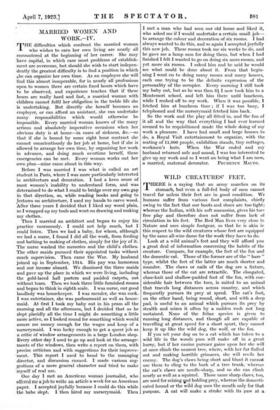MARRIED WOMEN AND
rrI-IE difficulties which confront the married woman who wishes to earn her own living are nearly all encountered, at the beginning of her career. She may 'have capital, in which case most problems of establish- ment are overcome, but should she wish to start indepen- dently the greatest difficulty is to find a position in which she can organize her own time. As an employee she will find this almost insuperable, for in nearly all professions open to women there are certain fixed hours which have to be observed, and experience teaches that if these hours are really hard and fast, a married woman with 'children cannot fulfil her obligation in the treble life she is undertaking. But directly she herself becomes an employer, or can afford an assistant, she can undertake many responsibilities which would otherwise be impossible. Every married woman knows of the many serious and absolutely imperative occasions when her obvious duty is at home—in cases of sickness, &c.—so that if she is bound by some eight hour contract she cannot conscientiously do her job at home, but if she is allowed to arrange her own time, by organizing her work in advance, and doing much overtime herself, these emergencies can be met. Every woman works out her own plan—mine came about in this way.
Before I was married I was what is called an art student in Paris, where I was more particularly interested in architecture and decoration. I had a keen sense of most women's inability to understand form, and was determined to do what I could to bridge over my own gap in that direction, so, while reading books and going to lectures on architecture, I used my hands to carve wood. 'After three years I decided that I liked my wood plain, 'so I wrapped up my tools and went on drawing and making my clothes..
Then -I married an architect and began -to enjoy his practice enormously. I could not help much, but I could listen. Then we had a baby, for whom, although we had a nurse, I found I did all the work, from feeding and bathing to making of clothes, simply for the joy of it. The nurse washed the nurseries and the child's. clothes. The other maids pursued their appointed tasks without much supervision. Then came the War. My husband joined up in September, 1914. His pay was humorous and our income absurd. We dismissed the three maids and gave up the place in which we were living, including the gold-laced hall porters and padded carpets, not without tears. Then we took three little furnished rooms and began to think in eighth scale. I was nurse, our good landlady was housekeeper. I was mender, she was cook. I was entertainer, she was parlourmaid as well as house- maid. At first I took my baby out in his pram all the morning and all the afternoon, but I decided that as he slept placidly all the time I might do something a little more active, so I looked round for something which would assure me money enough for the wages and keep of a 'nurserymaid. I was• lucky enough to get a queer job as a critic of window arrangements in a large London shop. Every other day I used to go up and look at the arrange- ments of the windows, then write a report on them, with -precise criticism and with suggestions for their improve- ment. This report I used to hand to the managing director, and discussion ensued. I-- made various sug- gestions of a more general character and tried to make 'myself of real use.
One day I met an American woman journalist, who offered me a job to write an article a week for an American paper. I accepted joyfully because I could do this while the babe slept. I then hired my nurserymaid. Then I met a man who had seen our old home and liked it, who asked me if I would undertake a certain small job— to arrange the colour and decoration of six rooms. I had always wanted to do this, and so again I accepted joyfully this new job. These rooms took me six weeks to do, and he gave me a lump sum for doing them, but when I had finished I felt I wanted to go on doing six more rooms, and yet more six rooms. I asked him and he said he would see what could be done about it. From that begin- ning I went on to doing many rooms and many houses, each one trying to be the definite expression of the personality of the occupier. Every morning I still took my baby out, but as he was then 84 I now took him to a Montessori school, and left him there until luncheon, while I rushed off to my work. When it was possible, I fetched him at luncheon time ; if I was too busy, I telephoned and the nurserymaid fetched him back.
So the work and the play all fitted in, and the fun of it all and the way that everything I had ever learned seemed to be requisitioned made the whole doing of my work a pleasure. I have had small and large houses to do, a Royal Visit entertainment to organize, with the seating of 11,000 people, exhibition stands, tiny cottages, workmen's huts. When the War ended and my husband returned safe and sound, I was too interested to give up my work and so I went on being what I am now, a married, maternal decorator. PRUDENCE MAUFE.










































 Previous page
Previous page